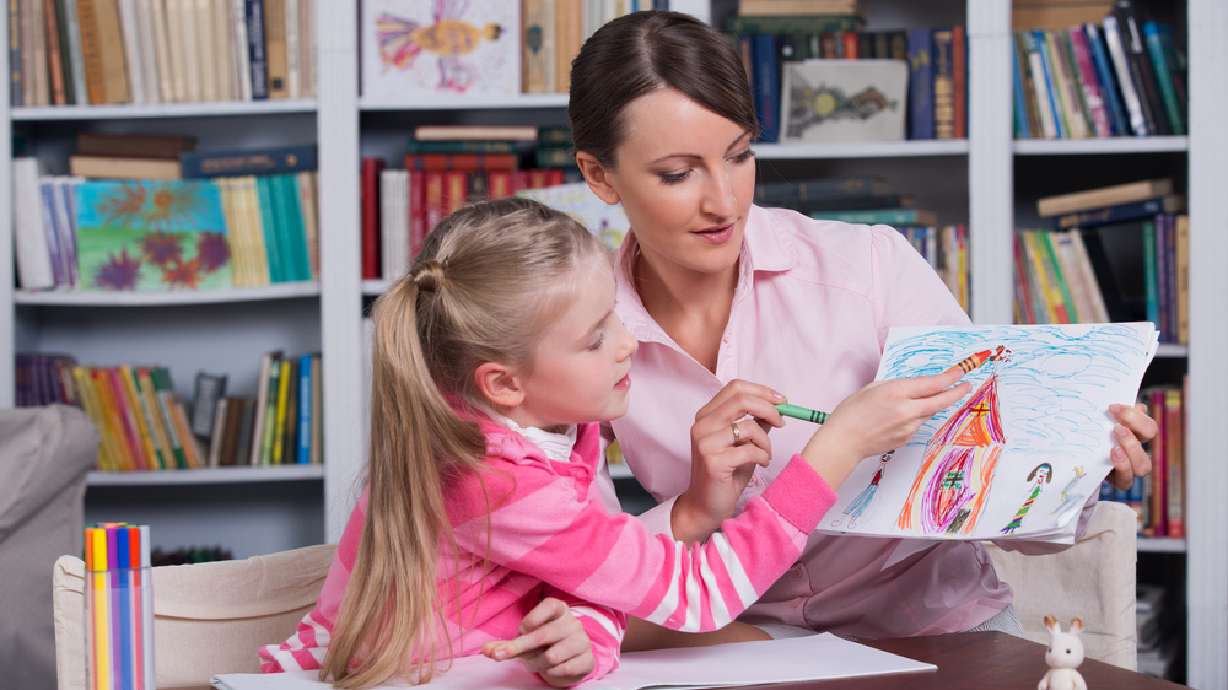Estimated read time: 4-5 minutes
This archived news story is available only for your personal, non-commercial use. Information in the story may be outdated or superseded by additional information. Reading or replaying the story in its archived form does not constitute a republication of the story.
SALT LAKE CITY — Does my child need therapy?
For the majority of children, the answer is no, but if you are wondering, read on.
As parents, our primary goal is to nurture and protect our children. When we consider that our child may benefit from mental health intervention many of us feel overwhelmed, guilty or ashamed. But this need not be the case. Life happens, and it happens to children too.
Therapy is a safe place to explore difficult events from the past or learn new life skills. Play therapy has some similarities and some differences from traditional talk therapy.
For example, we know that children make sense of the world through play. Additionally, their cognitive mechanisms are not fully developed yet and therefore focusing interventions purely based on talking and the use of language is less effective. We use play to bridge this gap.
When we consider that our child may benefit from mental health intervention many of us feel overwhelmed, guilty or ashamed. But this need not be the case. Life happens, and it happens to children too.
Play therapy relies on parents' input and cooperation. You know your child better than anyone else. You have the relationship and opportunity to best assist your child. Consider the therapist as a coach who provides instruction on things to do at home.
Many parents wonder if their child may benefit from therapy. There are several common reasons parents bring their children to be seen.
- History of trauma or abuseIf a child has been a victim of abuse it is to his or her benefit to process this information sooner rather than later. There are many evidence-based interventions that have proven effective in decreasing the impact on children. Their brains are still developing and learning ways to make sense of violent or abusive events and therapy helps them to re-organize and regulate better, both now and as an adult. Additionally, we often consider trauma something significant — for example, surviving a natural disaster — but more commonplace events such as car accidents or even dog bites have undoubtedly traumatized children. Often times if this is the case, you may see children re-enacting the event in their play. For example, making toy cars crash over and over again. This is a sign that they could benefit from intervention.
- Difficulty in peer relationshipsSocial and emotional health is a very important skill that children are learning during school years. School can also be a place of anxiety or loneliness for children who lack these skills. Conversely, children who are aggressive toward others often feel alienated. Successful peer relationships are a predictor of quality of life into adulthood. Individual and group therapy can provide a practicing ground for relating to peers in a healthy way.
- Emotional regulation difficultiesOften when teachers or daycare providers give feedback to parents such as “he is aggressive toward the other kids," or "it’s her way or the highway” they are ultimately referring to the ability for children to regulate their emotions. This is a learned skill. In fact, the parts of our brains responsible for reasoning and problem solving are not fully developed until we are into our 20’s. Despite this, children can learn tools and exercises to help identify and express feelings appropriately.
- Divorce or stepfamily buildingWhen families separate or new families develop, children may feel powerless because those decisions are not their own. Additionally, it’s very common for children to have a loyalty to both parents. Children benefit when parents are able to co-parent in a healthy way. This is, of course, easier said than done when any relationship ends there is inevitably pain, grief and sometimes anger. Play therapy with children focused on divorce or family building often aids in navigating this road.
- Something else that just doesn’t feel rightWe have intuition — sometimes we notice subtle changes in our child that we can’t articulate. Maybe his or her mood has shifted, perhaps there is an underlying anger brewing. At times, exploring this with a play therapist can ensure that we aren’t missing something.
Lastly, children are resilient. Early identification and treatment will prevent the loss of critical developmental years. Researcher Emmy Werner has identified children that are “active, affectionate and good-natured” are better able to cope with stressful life situations. Providing your child with the tools needed to work through this sometimes unpredictable world will benefit them for years to come.
Whitney Barrell, LCSW, has a master's of social work from the University of Utah. In her private practice she enjoys working with children and families on myriad mental health issues. She can be reached at www.whitneybarrellcounseling.com.








